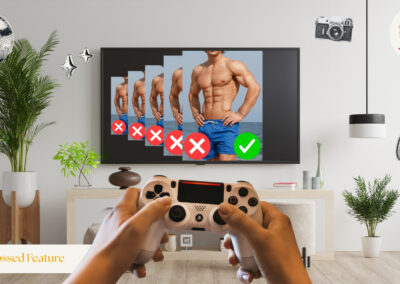With over 1 billion views under the hashtag, ‘Girl Dinner’ has become more than just a quirky TikTok trend – it’s a cultural moment that has sparked debates about food, feminism, and financial pressures. Here, Unglossed investigates.
Scrolling through TikTok, you’ve probably come across a plate of crackers, cheese and grapes proudly labelled as ‘Girl Dinner’. With over one billion views under the hashtag and countless videos showcasing snack-style meals, the trend has quickly become a cultural phenomenon for those nights when the idea of shopping, cooking, and dealing with a pile of dishes feels overwhelmingly exhausting… don’t worry, it’s a shared experience according to TikTok. Girl Dinner is for those evenings when you piece together whatever tasty bits and leftovers you’ve got lying around and call it a meal.
But beyond the humour and relatability lies something much deeper. Girl Dinner isn’t just about slapping together a plate of leftovers; it has become a symbol of autonomy, a reflection of economic realities, and even a battleground for debates surrounding societal expectations of women. So, what does this simple plate of snacks really say about us? Let’s dig in.
The ‘Girl Dinner’ trend, originally coined by TikTok Influencer Olivia Maher, for many has become a liberating way for women to reclaim how they eat, free from societal expectations. Olivia said: “Women are often expected to make meals that are not just functional, but also beautiful, especially in a social media landscape where perfection is everywhere. Girl Dinner flips that script—it’s messy, practical, and entirely about personal joy, and I think that’s really beautiful and empowering”.
For many women, this freedom is refreshing. Social media has normalized elaborate, photo-ready meals to the point where even breakfast can feel like a production, and Girl Dinner rejects all of that: “At its core, Girl Dinner is about reclaiming the narrative around food and self-care, and it’s about prioritizing individual needs over the societal expectations of women. It’s saying, ‘I don’t need to conform to these rules about what dinner should be.’ It’s just about listening to your body and enjoying what feels right in the moment.” said Olivia.
And judging by the comments on her viral video, this perspective resonates: “I originally made the viral video because it’s something I have always done and implemented in my life, so I thought it might resonate with others, and it was so exciting to see the immediate response in the comments of hundreds of women saying how they did the same thing, but they didn’t think anyone else did it,” Olivia said. “It felt like we all started coming out and dropping the facade of what we think we need to be.”
At first glance, Girl Dinner is a celebration of freedom – ditching perfectionism in favour of joyful simplicity… but is this always a choice? Let’s be honest—sometimes “Girl Dinner” isn’t just about being quirky or convenient. It’s about scraping together whatever you’ve got in the fridge because the weekly shop didn’t stretch far enough.
As the cost of living crisis continues to bite, snack-style meals can become a reflection of financial pressure rather than culinary creativity.
Fitness Coach and Nutritionist Deana Jamal also argues that the playful charm of ‘Girl Dinner’ masks a concerning potential to glorify restrictive eating habits. She said: “The danger is that social media trends like this glamorize meals that might not provide enough fuel, especially if someone’s regularly skipping more balanced options.”
In a world where 65% of women aged 25 to 45 engage in disordered eating behaviours, according to the Gillings School of Global Public Health, the importance of thinking about the broader implications of these trends is becoming increasingly vital. Deana said: “For someone recovering from disordered eating, seeing this trend could be triggering—it normalizes behaviours they’ve worked so hard to unlearn.
“A plate of cheese, crackers, and grapes, while delicious, isn’t nutritionally complete. A meal should ideally include a mix of protein, healthy fats, and fibre to sustain energy levels and keep you full. If you’re only eating cheese and crackers, you might feel full initially but crash later because you didn’t include enough nutrients. If it’s occasional, that’s fine, but if it becomes the default, it’s worth considering what’s driving that habit. Is it restrictive eating patterns disguised as convenience?”
Despite these concerns, Olivia Maher maintains that the trend provides comfort to those struggling financially and also emphasises the importance of allowing people to enjoy food without judgement: “For me, Girl Dinner is really about letting people enjoy food in a way that feels right for them and suits their financial position. If someone has cheese and crackers for dinner after a big lunch, or just throws together whatever they’ve got in the fridge, that’s okay. We don’t have to have those picture-perfect fridges you see all over social media. It’s about using what you have, fuelling yourself, and finding joy in that. Honestly, if you’re eating something at all, that’s a win, and it should be celebrated.”
But whilst the trend is seen as empowering for some, is it actually a double-edged sword? Studies show that diet culture disproportionately affects women, with over 50% of women surveyed saying they felt pressured to eat less in social settings. So, is ‘Girl Dinner’ subtly reinforcing these societal pressures?
Deana Jamal says: “I think real empowerment comes from nourishing your body, not from starving it in a way that looks cute online. We still live in a society where women are subtly praised for eating less, and the idea of having a ‘light’ meal might inadvertently feed into that. I get that rejecting the expectation that women should always prepare elaborate, “perfect” meals can be incredibly freeing, but I also think the trend definitely does feed into the idea that women are praised for eating minimal amounts.”
Noorie Khan, a politics graduate who shares her feminist insights on TikTok agrees, arguing that playful ‘Girl’ trends like Girl Dinner could subtly undermine the progress of the feminist movement. After all, why are ‘picky bits’ suddenly considered a ‘girl’ thing?
She said: “Gendering food is just odd. Why are we saying that a simple meal is now a ‘girl’ thing? On its own, it seems harmless, but if we situate it within the broader context of gender essentialism and antifeminist politics, it actually pushes women into this submissive, incapable role that will never sit right with me.”
Noorie argues that while Girl Dinner might feel empowering, it often reinforces the very stereotypes it wants to reject: “Associating small, not very nutritious food with women will never serve to be empowering. Yes, it might feel good in the moment, but it ultimately perpetuates the idea that women are incapable of looking after themselves. It’s not subversive, it’s just repackaging gender essentialism in a sparkly pink way.
“Ultimately, in the current political climate—with overturned abortion rights and active attacks on women’s autonomy—these ‘girl’ trends reflect and contribute to how society views women. They’re not disconnected from larger cultural and political issues, and I think people sometimes forget that.”
So where does that leave us? Whilst ‘Girl Dinner’ might seem like just a fun, quirky trend on the surface, what started as a light-hearted celebration of personal joy and convenience, has now unravelled layers of wider cultural tensions around gender, food and societal expectations. It’s a reminder that even the simplest trends can say a lot about the world we’re living in, and perhaps the real question isn’t what we’re eating, but what these trends are really feeding into.










